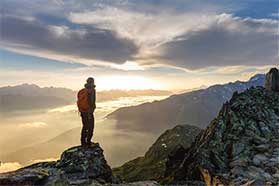Altitude Sickness Treatment in Oldsmar, FL
What Is High Altitude Sickness?

High altitude sickness, also known as acute mountain sickness (AMS), is a common ailment that occurs due to a lack of oxygen at high altitudes, usually above 8,000 feet or 2,400 meters. While the effects of AMS are similar to a hangover and typically do not require medical treatment, AMS is a warning sign that you are at a heightened risk of experiencing more serious forms of altitude sickness.
AMS is the first of three types of altitude sickness. The two more severe high altitude sicknesses are:
- High-altitude pulmonary edema (HAPE): HAPE is caused by excess fluid in the lungs that leads to breathlessness, even while in a state of rest. Symptoms of HAPE include a fever and coughing up frothy saliva.
- High-altitude cerebral edema (HACE): HACE is characterized by fluid in the brain, and its symptoms include confusion, stumbling, laziness, emotional swings, and loss of conscious.
Both HAPE and HACE can lead to either severe health consequences or death in a matter of hours if left untreated. This is why it is important to recognize and address the symptoms of AMS when they occur. To schedule a consultation with a qualified healthcare professional in Oldsmar who specializes in high altitude sickness treatment, call (727) 240-3424 or contact Maharajh Acupuncture & Herb Shoppe online.
What Causes Altitude Sickness?
AMS most commonly occurs as a result of traveling to high altitudes at a rapid pace, specifically 500mm per day, while doing activities such as climbing, hiking, or driving. In these situations, your body is unable to acclimate to higher altitudes, specifically the decrease in oxygen levels. The higher the altitude you reach and the pace you travel at can contribute to the likelihood of developing symptoms of altitude sickness. Additionally, vigorous exercise, a lack of fluids and hypothermia makes AMS more likely to occur.
Although AMS can affect anyone, there are certain risk factors that can make AMS more likely for some individuals than others. These factors include:
- Having a heart or lung disease
- A low red blood cell count
- Taking drugs that can affect your breathing (sleeping pills or narcotic pain relievers)
- Past history of AMS
- Pregnancy
High Altitude Sickness Symptoms
Symptoms of AMS usually appear within 24 to 48 hours of elevation change. Some people have compared the symptoms of AMS to a bad hangover.
Some of the immediate and mild altitude sickness symptoms include:
- Fatigue or weakness
- Dizziness
- Headache
- Nausea or vomiting
- Rapid heart rate
- Shortness of breath after exertion
- Insomnia
- Lack of appetite
- Irritability
- Swelling of the hands, feet, and face
Symptoms indicating the onset of HAPE and HACE include:
- Shortness of breath without exertion
- Wet coughing
- Tightness in the chest
- Confusion
- Social withdrawal
- Blue, gray, or pale skin discoloration
- Coma
Diagnosing Altitude Sickness
Although the symptoms of AMS are a good indicator of the disease itself, there are several ways that medical professionals can test for the more serious HAPE or HACE. These tests include:
- Listening to the chest with a stethoscope
- A chest X-ray
- Blood test
- Brain MRI or CT scan
- An electrocardiogram (ECG)
How to Treat Altitude Sickness
If your altitude sickness symptoms are mild, your body may adapt to the altitude change on its own. However, there are several different ways to treat AMS in order to avoid contracting HAPE or HACE. Once treated, symptoms can take several hours or days to disappear.
If you are experiencing signs of altitude sickness:
- Descend immediately
- Do not ascend higher for at least 24-48 hours
- If descending is not possible, rest and drink water
- Use pressure bags or oxygen
- Avoid exercise
If symptoms persist despite attempts to treat AMS on your own, there are several medications available that can help to reduce your symptoms, such as acetazolamide. Ingesting acetazolamide before acceding can help prevent AMS, and the drug can also correct breathing problems if AMS does occur.
Other altitude sickness medications include:
- Dexamethasone to reduce brain swelling
- Ibuprofen to relieve pain from headaches
- Nifedipine to treat high blood pressure
How to Prevent Altitude Sickness
The best treatment for high altitude sickness is prevention. If your future travel plans involve activities which take you to higher elevations, it is important to plan ahead to avoid these uncomfortable symptoms. In order to avoid AMS altogether, there are various preventative measures you can try, including:
- Avoiding high altitudes, if possible
- Acclimating your body to higher altitudes for 24-48 hours before completing vigorous activity
- Avoiding alcohol, caffeine, salty foods, and smoking
- Drinking plenty of water
There is no reason to let high altitude sickness affect your vacation. To schedule a consultation with a qualified travel health specialist in Oldsmar call (727) 240-3424 or contact Maharajh Acupuncture & Herb Shoppe online.
Maharajh Acupuncture & Herb Shoppe
Address
5805 Main StNew Port Richey, FL 34652
(727) 240-3424
www.maharajhacupuncture.com
Hours
Mon:
10:00 am - 5:00 pm
Tue:
10:00 am - 5:00 pm
Wed:
10:00 am - 5:00 pm
Thu:
10:00 am - 6:00 pm
Fri:
10:00 am - 3:00 pm
Sat:
Closed
Sun:
Closed

